Vitamin D and Mental Health in Parkinson’s: Why Deficiency Matters
Introduction
When people think about vitamin D, they usually picture sunshine and bone health. But in recent years, scientists have discovered that this vital nutrient plays a much deeper role in brain function and emotional well-being — particularly for those living with neurological conditions like Parkinson’s disease.
For many people with Parkinson’s, fatigue, anxiety, and depression can appear alongside physical symptoms such as tremors and stiffness. These emotional and cognitive challenges are often assumed to be “side effects” of the disease, yet growing research suggests they may also be tied to vitamin D deficiency.
In fact, vitamin D acts more like a hormone than a simple vitamin — influencing mood regulation, neurotransmitter balance, and inflammation in the brain. And since deficiency is common in Parkinson’s, understanding how it impacts mental health could open new doors for relief, stability, and a renewed sense of vitality.
Looking for supplements for This? Click here.
☀️ The Overlooked Connection Between Vitamin D and the Brain
Vitamin D has receptors scattered throughout the brain — particularly in regions that regulate mood, such as the hippocampus, prefrontal cortex, and substantia nigra. These areas are also directly affected by Parkinson’s disease. When vitamin D levels are low, those brain regions become more vulnerable to inflammation and oxidative stress.
Researchers now understand that vitamin D helps regulate key neurotransmitters like dopamine and serotonin. Both are essential for maintaining mood, focus, and emotional resilience. In Parkinson’s disease, where dopamine production naturally declines, the presence of adequate vitamin D can help sustain the health of remaining neurons and support mood stabilization.
The vitamin also plays a vital role in calcium signaling — a process that helps neurons communicate efficiently. Without enough vitamin D, nerve communication slows, cognitive clarity fades, and emotional regulation becomes harder.
In essence, vitamin D isn’t just a “sunshine vitamin.” It’s a chemical messenger that tells the brain how to protect itself, how to respond to stress, and how to maintain balance in an ever-changing internal environment.
🌧️ Why Deficiency Is So Common in Parkinson’s
People with Parkinson’s are significantly more likely to be vitamin D deficient than the general population. Several factors contribute to this imbalance.
Reduced mobility often means less time outdoors, which lowers natural sunlight exposure — the primary way humans synthesize vitamin D. In addition, Parkinson’s can bring about fatigue and apathy, leading to decreased motivation to go outside. Some medications may also interfere with vitamin D metabolism or absorption, especially if dietary intake is already low.
The aging process compounds the problem. Older skin produces less vitamin D from sunlight, and the kidneys — which activate the vitamin — often function less efficiently over time. Combine all these elements with the subtle inflammation present in Parkinson’s, and the result is a perfect storm for deficiency.
What’s concerning is that this deficiency doesn’t just affect bones or muscles. It touches every part of the nervous system, quietly amplifying emotional instability, cognitive decline, and fatigue.
💭 Vitamin D and Depression in Parkinson’s
Depression in Parkinson’s disease is not simply psychological. It’s neurochemical. The loss of dopamine and the chronic stress of living with a degenerative condition can alter serotonin and norepinephrine levels — the very chemicals that keep mood stable.
Vitamin D acts as a natural modulator for these neurotransmitters. It enhances the conversion of tryptophan to serotonin and helps maintain proper dopamine receptor function. Without it, the communication between mood-regulating brain cells becomes sluggish and erratic.
Several studies have shown that people with lower vitamin D levels are more likely to experience depression — both in the general population and among those with Parkinson’s. One 2014 study found that individuals with Parkinson’s and sufficient vitamin D had better mood, cognition, and daily functioning than those who were deficient.
Another meta-analysis from 2020 confirmed that vitamin D supplementation led to measurable improvements in depressive symptoms. The reason is likely multifaceted: vitamin D reduces inflammation, supports mitochondrial energy production, and enhances neurotrophic growth factors like BDNF, which promote neuronal health.
In simpler terms, vitamin D helps the brain recover from stress, communicate efficiently, and sustain emotional equilibrium — all of which are essential in managing depression related to Parkinson’s disease.
Looking for supplements for This? Click here.
😟 Anxiety, Stress, and the Role of Vitamin D
Anxiety is another common yet often underestimated symptom in Parkinson’s disease. It can manifest as restlessness, racing thoughts, muscle tension, or fear during “off” medication periods when dopamine levels drop.
Vitamin D helps regulate the hypothalamic-pituitary-adrenal (HPA) axis, the body’s central stress system. When this axis becomes overactive, cortisol levels rise, leading to heightened anxiety and irritability. Adequate vitamin D helps tone down this overactivity by promoting GABAergic and serotonergic balance — the same calming systems that are often targeted by anti-anxiety medications.
Additionally, vitamin D influences calcium channels in neurons, stabilizing electrical activity in the brain. When calcium signaling becomes erratic, the nervous system tends to shift toward hyperexcitability — the same physiological state that underlies chronic anxiety.
By maintaining stable calcium flow and lowering systemic inflammation, vitamin D creates a biochemical environment that supports calm and clarity rather than panic and agitation.
🧠 Vitamin D and Cognitive Clarity
Cognitive decline in Parkinson’s is one of the most frustrating symptoms, both for patients and caregivers. Difficulties with focus, memory, or decision-making can feel disheartening, especially when they appear alongside emotional challenges.
Vitamin D plays a direct role in protecting brain cells from degeneration. It stimulates the production of neurotrophic factors — proteins that support neuron survival and plasticity. One such molecule, BDNF (brain-derived neurotrophic factor), is often found in lower levels in people with Parkinson’s. By increasing BDNF, vitamin D encourages the brain to adapt and repair itself.
It also enhances mitochondrial efficiency. Mitochondria are the energy centers of cells, and when they function poorly, neurons become sluggish and vulnerable. Vitamin D helps maintain mitochondrial membrane integrity, ensuring that energy production remains steady.
A 2015 study published in Journal of Neurology found that Parkinson’s patients with higher vitamin D levels performed better on tests measuring memory, attention, and executive function. This suggests that vitamin D doesn’t just prevent decline — it may actively preserve cognitive sharpness.
This cognitive protection likely stems from its anti-inflammatory and antioxidant roles. By dampening microglial overactivation (a key driver of neuroinflammation in Parkinson’s), vitamin D reduces oxidative stress, allowing neurons to communicate more clearly and efficiently.
The result is often subtle yet noticeable: improved focus, greater alertness, and an easier time connecting emotionally with others.
💚 The Emotional Layer: How Vitamin D Shapes Resilience
Beyond its chemical and cellular roles, vitamin D influences emotional resilience — the ability to recover from stress, disappointment, or physical symptoms.
People with Parkinson’s often experience what psychologists call “learned helplessness” — a gradual erosion of confidence that happens when effort seems to yield little control over one’s body. Vitamin D, by stabilizing mood and energy, can indirectly help rebuild that sense of agency.
When vitamin D levels rise, many individuals report sleeping better, feeling calmer, and experiencing brighter moods. This isn’t a placebo effect; it reflects improved serotonin signaling and reduced inflammatory cytokines that can cloud thinking and dampen motivation.
Emotional resilience is not merely about positive thinking — it’s a biological state of balance. And vitamin D, through its hormonal and neurochemical effects, supports that state from the ground up.
🌿 The Anti-Inflammatory Shield
Chronic inflammation lies at the heart of both Parkinson’s progression and its mental health symptoms. It contributes to neuronal death, fatigue, mood swings, and even changes in gut function that further disturb emotional regulation.
Vitamin D acts as a natural anti-inflammatory agent. It suppresses NF-κB activation — a key pathway that drives inflammation — and promotes the release of anti-inflammatory cytokines. This reduces the toxic cycle that damages dopamine neurons and destabilizes emotional balance.
In this sense, vitamin D operates as a shield: protecting the brain not only from further physical deterioration but from the emotional chaos that chronic inflammation produces.
When the body is inflamed, neurotransmitters like serotonin and dopamine are diverted toward managing immune stress rather than maintaining mood. By calming the immune response, vitamin D helps redirect those biochemical resources back toward emotional regulation and cognitive clarity.
🌸 The Gut-Brain-Vitamin D Axis
Recent studies have highlighted how the gut microbiome influences both Parkinson’s disease and mood. Vitamin D plays an essential role in maintaining the integrity of the gut barrier and promoting beneficial bacteria that produce mood-regulating metabolites like short-chain fatty acids.
When vitamin D is deficient, harmful bacteria can overgrow, leading to leaky gut and systemic inflammation — both of which can worsen anxiety, fatigue, and depression.
By restoring gut balance, vitamin D indirectly supports serotonin production, as over 90% of serotonin is made in the gut. This connection between sunlight, digestion, and mental stability paints a holistic picture of how deeply vitamin D interacts with the mind.
A well-regulated gut ecosystem sends calming, positive signals to the brain, while an inflamed gut amplifies fear and stress. Vitamin D sits at the crossroads of that communication system, ensuring harmony between the two.
🌤️ The Sleep Connection
Quality sleep is one of the first casualties of Parkinson’s and one of the most essential foundations for mental health. Interestingly, vitamin D receptors are found in regions of the brain that regulate the sleep-wake cycle, including the hypothalamus.
Low vitamin D can disrupt melatonin synthesis, leading to insomnia or fragmented sleep. Poor sleep, in turn, worsens anxiety and depression, creating a self-reinforcing loop.
By correcting deficiency, vitamin D helps reestablish the body’s natural circadian rhythm. Patients often report fewer nighttime awakenings, smoother transitions into rest, and more energy upon waking. Over time, this contributes to a more stable emotional baseline and sharper cognition.
🌞 Safe Supplementation and Practical Considerations
The ideal vitamin D level for neurological and mental health benefits tends to be higher than what’s traditionally considered adequate for bone health. While the general threshold for deficiency is below 30 ng/mL (75 nmol/L), many experts recommend maintaining levels between 40–60 ng/mL for optimal brain support.
For most adults, supplementing with 1,000 to 2,000 IU per day is sufficient for maintenance, though those who are deficient may need higher doses temporarily under medical supervision. Vitamin D3 (cholecalciferol) is the preferred form, as it is more effectively converted in the body.
Since vitamin D is fat-soluble, it’s best absorbed when taken with meals that contain healthy fats such as avocado, olive oil, or nuts. Regular sunlight exposure — around 15–30 minutes a day on bare skin — remains the most natural and synergistic way to boost levels, especially when combined with a nutrient-rich diet.
Magnesium is another cofactor that enhances vitamin D activation. Without enough magnesium, supplementation may not translate effectively into increased blood levels. Thus, pairing both nutrients may provide superior results in mood and cognition.
🌈 A Holistic Approach to Emotional Well-Being in Parkinson’s
While vitamin D is a crucial piece of the mental health puzzle, it works best as part of a broader lifestyle approach that addresses both physical and emotional balance.
Combining vitamin D supplementation with mindfulness practices, gentle exercise, breathwork, and therapy can create a synergistic effect. The body becomes more responsive to psychological interventions when its biochemistry is stable.
Exercise, for example, naturally raises BDNF — the same neurotrophic factor enhanced by vitamin D. Breathwork helps regulate cortisol and improve oxygenation, supporting brain metabolism. Therapy offers cognitive tools to reinterpret emotional stressors, while vitamin D supports the biological capacity to implement those insights.
Together, these practices create a feedback loop of healing. The mind strengthens the body, and the body, nourished with sunlight and nutrients, strengthens the mind.
💬 Reclaiming Emotional Light
Parkinson’s may bring moments of darkness — not just in movement, but in spirit. Yet within that darkness, light still exists, sometimes quite literally, in the form of the sun’s power to heal the human brain.
Vitamin D reminds us that emotional balance isn’t only about thoughts or mindset; it’s also about biology — about the body’s ability to support the mind with the raw materials it needs to feel hopeful and grounded.
When vitamin D deficiency is corrected, the world often seems a little brighter, the fog a little thinner, and the future a little more possible. That’s not magic; it’s biochemistry aligning with the rhythm of life.
For people with Parkinson’s, nourishing the brain with vitamin D may not erase the challenges, but it can transform how those challenges are experienced — less as battles to be fought, and more as waves to be balanced with steadiness and grace. 🌿✨
Looking for online therapy ? Click Here.
📚 References
Peterson, A. L., et al. (2013). Vitamin D status and Parkinson’s disease: Associations with mood and cognition. Journal of Parkinson’s Disease, 3(4), 547–555.
Suzuki, M., et al. (2013). Vitamin D receptor gene polymorphism and Parkinson’s disease. Movement Disorders, 28(5), 700–707.
Eyles, D. W., et al. (2013). The neurosteroid vitamin D and its regulation of neural function and behavior. Frontiers in Neuroendocrinology, 34(1), 47–64.
Zhu, J., et al. (2020). Vitamin D and depressive symptoms in Parkinson’s disease: A meta-analysis. Neuropsychiatric Disease and Treatment, 16, 1093–1102.
Menza, M., & Dobkin, R. D. (2005). The role of depression, anxiety, and vitamin D deficiency in Parkinson’s disease. Current Psychiatry Reports, 7(4), 282–288.
Knekt, P., et al. (2014). Vitamin D and depression: Causal or confounded? Journal of Affective Disorders, 155, 294–299.
Bivona, G., et al. (2020). Vitamin D and neuroinflammation: A link between multiple sclerosis, Parkinson’s, and depression. Nutrients, 12(6), 1489.
Wang, Y., et al. (2021). Vitamin D deficiency, gut dysbiosis, and neuroinflammation in Parkinson’s disease. Frontiers in Aging Neuroscience, 13, 624764.
Cannell, J. J., & Grant, W. B. (2013). The role of vitamin D in neuropsychiatric disorders. CNS Drugs, 27(1), 21–47.
Littlejohns, T. J., et al. (2014). Vitamin D and cognitive decline: A prospective study. JAMA Neurology, 71(12), 1509–1516.
Related Posts
-
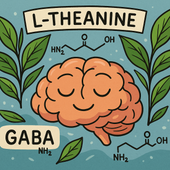
L-Theanine and GABA: Natural Calm for Parkinson’s-Related Anxiety
Anxiety in Parkinson’s often feels overwhelming — a constant inner tension that affects both body and mind. 🌿 This article explores how L-theanine and GABA, two natural compounds that promote relaxation without sedation, can help restore balance, ease restlessness, and calm the nervous system for a more peaceful state of mind. 🌙
-
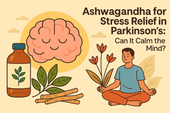
Ashwagandha for Stress Relief in Parkinson’s: Can It Calm the Mind?
Ashwagandha, the ancient Ayurvedic adaptogen, may offer powerful stress relief for people with Parkinson’s. 🌿 By regulating cortisol, calming the nervous system, and supporting dopamine balance, this natural herb helps ease anxiety, improve sleep, and promote emotional stability — restoring calm from the inside out. 🌙
-
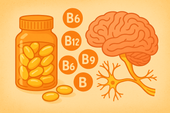
B Vitamins for Mood and Nerve Health in Parkinson’s Patients
B vitamins play a vital role in protecting the brain and nervous system in Parkinson’s. 🌿 From supporting dopamine production to reducing homocysteine and improving mood, these essential nutrients — especially B6, B9, and B12 — help stabilize emotions, boost energy, and preserve nerve integrity for better daily function and mental clarity. 💫
-
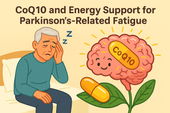
CoQ10 and Energy Support for Parkinson’s-Related Fatigue
Fatigue in Parkinson’s goes far beyond tiredness — it’s a deep cellular exhaustion. ⚡ CoQ10, a natural compound essential for energy production, may help restore vitality by supporting mitochondrial function and protecting brain cells from oxidative stress. Discover how CoQ10 can enhance energy, reduce fatigue, and improve overall resilience in Parkinson’s. 🌿
-
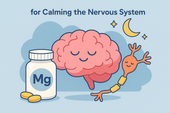
Magnesium for Calming the Nervous System in Parkinson’s
Magnesium is one of the most underrated allies for people with Parkinson’s. 🌿 This calming mineral supports the brain, relaxes tense muscles, and stabilizes the nervous system, helping reduce anxiety, restlessness, and sleep problems. Discover how magnesium nourishes dopamine pathways, protects neurons, and restores a sense of inner peace from within. 💫
-

Omega-3s and Parkinson’s: Supporting Mood and Cognitive Clarity
Omega-3 fatty acids are among the most powerful nutrients for supporting brain health and emotional well-being in people with Parkinson’s. 🧠 This article explores how omega-3s strengthen neuronal membranes, improve dopamine and serotonin signaling, reduce inflammation, and promote cognitive clarity. Learn how these essential fats can help ease anxiety, lift mood, and protect your mind from oxidative stress naturally. 🌿
-
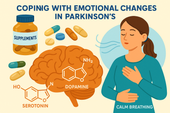
Coping with Emotional Changes in Parkinson’s: Supplements That Support Balance
Emotional changes like anxiety, depression, and irritability are common yet often overlooked symptoms of Parkinson’s disease. This article explores how supplements such as omega-3s, magnesium, and vitamin D can support mood regulation, while therapy and breathwork techniques help restore calm and emotional balance naturally. 🌿
-
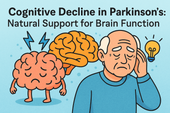
Cognitive Decline in Parkinson’s: Natural Support for Brain Function
Cognitive decline in Parkinson’s can affect memory, focus, and daily independence—but there’s hope. Understanding how the disease impacts brain chemistry opens the door to natural ways of support. From omega-3s and CoQ10 to mindfulness and exercise, you can nourish your brain, boost clarity, and slow decline through holistic care. 🌿🧠
-
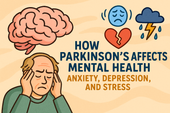
How Parkinson’s Affects Mental Health: Anxiety, Depression, and Stress
Dopamine is the brain’s spark of motivation—the chemical that fuels focus, pleasure, and drive. When dopamine levels are balanced, you feel inspired and alive; when they’re low, everything feels like an uphill climb. Understanding how dopamine works can help you support mental clarity, resilience, and emotional balance naturally. ⚡🧠
-

How Supplements Can Support Therapy and Healing from Co-Dependency
Biology is the science of life—an exploration of how cells, systems, and molecules create the foundation for every thought, emotion, and heartbeat. From the way our DNA shapes us to how hormones and neurons communicate, biology reveals the deep interconnectedness between mind and body. Understanding it helps us appreciate the delicate balance that keeps us alive, aware, and evolving. 🌿🧬
-
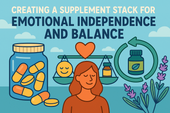
Creating a Supplement Stack for Emotional Independence and Balance
Biochemistry is the invisible language of life—how molecules, cells, and systems communicate to keep your body and mind in balance. From neurotransmitters shaping emotions to enzymes fueling energy, every process in your body reflects biochemical harmony. Understanding these reactions helps you see how nutrition, supplements, and emotions intertwine to support health, mood, and resilience. ⚗️🌿
-
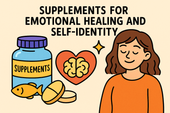
Supplements for Supporting Emotional Healing and Self-Identity
Biology is the bridge between mind and body—the science that explains how cells, hormones, and systems communicate to sustain life. It reveals how emotional states influence physical health, and how nourishment, rest, and movement keep us in balance. Understanding biology helps us reconnect with our natural intelligence and live in harmony with ourselves and the world. 🌿🔬
-
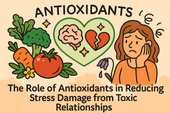
The Role of Antioxidants in Reducing Stress Damage from Toxic Relationships
Biology is the study of life in motion—the intricate dance between cells, systems, and the natural world. From DNA replication to neurotransmitter flow, every process in the human body reflects the intelligence of life adapting and evolving. Understanding this harmony helps us appreciate how nutrition, stress, and environment shape our health and emotional balance. 🌿🔬
-
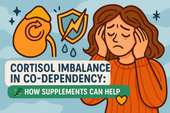
Cortisol Imbalance in Co-Dependency: How Supplements Can Help
Cortisol is the body’s main stress hormone—essential for energy and focus, yet harmful when chronically elevated. When life feels like constant pressure, cortisol imbalance can trigger fatigue, anxiety, and mood swings. Learning how to restore balance through rest, nutrition, and the right supplements can help you rebuild calm, clarity, and resilience from the inside out. 🌿💫
-
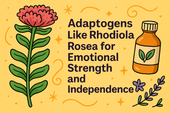
Adaptogens Like Rhodiola Rosea for Emotional Strength and Independence
Adaptogens are nature’s stress-balancing herbs—plants like Rhodiola, Ashwagandha, and Holy Basil that help your body adapt to emotional and physical pressure. They don’t numb or overstimulate; they teach your system how to find calm and stability again. By restoring balance to your hormones, energy, and mood, adaptogens nurture emotional resilience and grounded strength. 🌿✨
-
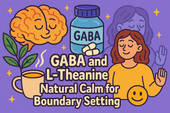
GABA and L-Theanine: Natural Calm for Boundary Setting
Anxiety can feel like a storm inside your mind—constant tension, overthinking, and the inability to relax even when you’re safe. But beneath the chaos, your body is simply trying to protect you. Learning to calm anxiety starts with understanding how your brain and nervous system respond to stress—and how to gently guide them back to peace. 🌿💫
-
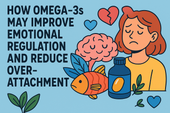
How Omega-3s May Improve Emotional Regulation and Reduce Over-Attachment
Inflammation isn’t just about sore joints or fatigue—it’s also a hidden driver of mood swings, anxiety, and emotional burnout. When chronic stress or poor diet keep the body inflamed, the brain’s chemistry changes, making calm harder to access. Learning how to reduce inflammation through nutrition, rest, and mindful living helps restore balance from the inside out. 🌿💫
-
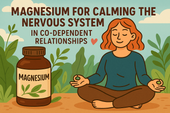
Magnesium for Calming the Nervous System in Co-Dependent Relationships
The nervous system is the body’s communication network, linking your mind and organs through a delicate web of electrical signals. It controls everything from emotional responses to muscle movement—and when it’s overwhelmed by chronic stress or anxiety, balance is lost. Learning how to calm and nourish your nervous system through nutrition, mindfulness, and rest can restore peace and emotional stability. 🌿💫
-

Ashwagandha and Co-Dependency: Supporting Stress Resilience
Stress is more than a feeling—it’s a full-body signal that your system is overwhelmed. When the mind races and the body tenses, your hormones, breathing, and focus all shift into survival mode. Chronic stress doesn’t just affect emotions—it reshapes your nervous system, drains your energy, and clouds your clarity. Learning to understand and manage stress gently is the first step toward peace, balance, and true recovery. 🌿💫
-

Why Co-Dependency Feels Draining: Adrenal Fatigue and Supplements That Help
The adrenal glands are small but powerful organs that sit above your kidneys, acting as your body’s built-in stress managers. They produce hormones like cortisol and adrenaline that help regulate energy, mood, and resilience. When they’re overworked from chronic stress or emotional exhaustion, fatigue and imbalance follow. Supporting adrenal health naturally can help restore calm, energy, and hormonal balance. 🌿⚡
-

The Link Between Anxiety, Co-Dependency, and Natural Support
Anxiety feels like living in constant alert mode—your heart races, your thoughts loop, and your body can’t find peace. It’s the nervous system’s way of preparing for danger, even when none exists. Understanding what’s happening in your mind and body is the first step toward calming the storm and restoring balance. 🌿💫
-

Supplements That Support Dopamine and Serotonin in Co-Dependent Patterns
Serotonin is the neurotransmitter of calm, confidence, and contentment. When it’s balanced, you feel peaceful and emotionally grounded. When it’s low, anxiety, mood swings, and emotional dependence take over. By understanding serotonin’s role in emotional health—and how to support it naturally—you can rebuild inner stability, improve relationships, and cultivate lasting happiness from within. 🌞💫
-

How Emotional Exhaustion in Codependency Impacts the Nervous System
The nervous system is the body’s communication network, connecting the brain to every organ and muscle. It regulates stress, mood, and emotion through a delicate balance of electrical and chemical signals. When overwhelmed, it can become dysregulated—leading to fatigue, anxiety, and emotional imbalance. Understanding how to calm and strengthen the nervous system is key to healing from chronic stress and emotional burnout. ⚡🌿
-

What Is Co-Dependency? The Role of Brain Chemistry and Stress
Stress is more than a feeling—it’s a full-body experience that begins in the brain and ripples through every cell. When cortisol surges and the nervous system stays on alert, your body can’t rest or recover. Over time, this constant tension affects energy, focus, mood, and even immune health. Understanding stress chemistry is the first step toward breaking free from burnout and finding calm again. 🌿
-

Creating a Supplement Stack for Motivation, Energy, and Anti-Procrastination
Motivation is the fuel behind every meaningful achievement—but it’s not just about willpower. It’s a mix of mindset, brain chemistry, and momentum. When energy, focus, and purpose align, action feels natural instead of forced. Learn how to harness motivation as a daily state, not a fleeting feeling.
-

Supplements for Building Consistency and Reducing Chronic Procrastination
Biochemistry is the bridge between biology and chemistry—the science of life at the molecular level. It explains how nutrients, hormones, and neurotransmitters interact to create energy, thought, and emotion. From brain function to muscle movement, biochemistry reveals the invisible processes that sustain health, balance, and vitality.
-

GABA and Procrastination: Supporting Calm Focus for Productivity
GABA is the brain’s natural calming messenger—a neurotransmitter that helps slow mental overactivity and ease stress. When GABA levels drop, focus fades, anxiety rises, and procrastination becomes more likely. By supporting GABA through nutrition, lifestyle, and supplements, you can restore calm clarity, improve focus, and take action with steady, balanced energy.
-

Ashwagandha and Procrastination: Lowering Stress to Improve Action
Science is the language of curiosity and discovery. It helps us understand the hidden patterns behind life, energy, and the universe. Through experimentation and critical thinking, science connects imagination to evidence—turning questions into knowledge. Whether through microscopes, molecules, or minds at work, science represents our endless pursuit of truth and innovation.
-

Neurotransmitters and Motivation: Supplements That Support Drive and Focus
Supplements can do more than boost physical health—they can also enhance mental clarity, focus, and motivation. Nutrients like omega-3s, magnesium, B vitamins, and adaptogens help balance neurotransmitters, stabilize mood, and support brain energy. When combined with good sleep, nutrition, and mindful habits, they can transform how your brain performs under stress.
-

How Stress Hormones Like Cortisol Fuel Procrastination (and What Helps)
Blood sugar isn’t just about physical health—it directly impacts focus, mood, and motivation. When glucose levels spike and crash, energy and attention do the same, fueling procrastination and brain fog. Learning how to stabilize blood sugar through balanced meals, mindful habits, and key nutrients helps keep your mind steady, focused, and ready to act.
-

Brain Fog and Procrastination: Supplements for Mental Clarity
Brain fog can turn even simple tasks into mental hurdles. When your thoughts feel slow and unclear, procrastination often follows—making focus and productivity seem impossible. This article explores the biochemical and lifestyle causes of brain fog and reveals the most effective supplements for restoring mental clarity, focus, and sustained energy.
-

The Link Between Low Energy and Procrastination: Can Supplements Help?
Neurochemistry shapes how we think, feel, and act. When neurotransmitters like dopamine, serotonin, and GABA fall out of balance, it can lead to fatigue, anxiety, or lack of motivation—fueling procrastination and low mood. Understanding the brain’s chemical communication system helps us find ways to restore focus, calm, and emotional stability through nutrition, mindfulness, and targeted supplements.
-

Why Do We Procrastinate? The Role of Dopamine and Supplements That Support It
Dopamine is the brain’s motivation messenger—the chemical that fuels focus, reward, and drive. When dopamine levels drop, even simple tasks can feel impossible to start. This article explores how dopamine shapes procrastination, motivation, and mental energy, along with natural supplements and daily habits that help restore balance and get things done.
-

Phosphatidylserine and Stress Reduction for People with BDD
Stress is more than a mental state—it’s a full-body experience that affects hormones, brain chemistry, and emotional balance. For people with Body Dysmorphic Disorder (BDD), constant tension and worry about appearance can overload the nervous system. Learning how stress works and finding ways to calm it is key to breaking the cycle of anxiety and self-criticism.
-

How Antioxidants Like Vitamin C & E Support Mental Health in BDD
Antioxidants are the body’s natural defense against stress and inflammation. For people with Body Dysmorphic Disorder (BDD), oxidative stress can worsen fatigue, anxiety, and emotional imbalance. Nutrients like Vitamin C and E help protect brain cells, boost neurotransmitter function, and support a calmer, clearer mindset—building a stronger foundation for recovery.
-

Ginkgo Biloba and Memory Support for BDD Recovery
Emotional regulation is the foundation of healing from Body Dysmorphic Disorder (BDD). When the nervous system stays in constant overdrive, even small stressors can trigger self-critical spirals. Learning to calm emotional reactivity helps restore clarity, confidence, and a sense of inner balance. By blending mindfulness, nervous system support, and self-compassion, you can retrain your brain to respond—not react—to emotion.
-

Alpha GPC and Cognitive Function in Body Dysmorphic Disorder
Mental fatigue can feel like your brain has hit a wall—thoughts slow down, focus fades, and motivation disappears. For people with Body Dysmorphic Disorder (BDD), chronic overthinking, emotional stress, and constant self-evaluation can deplete mental energy even further. Understanding what causes this cognitive exhaustion is the first step toward recovery—through rest, balanced nutrition, and targeted brain-supporting supplements.
-

N-Acetyl L-Tyrosine and BDD: Supporting Mental Clarity
Chronic stress doesn’t just affect your mood—it reshapes your brain chemistry, weakens focus, and fuels the obsessive thought loops common in Body Dysmorphic Disorder (BDD). Over time, constant cortisol elevation drains mental energy and emotional balance. Learning to recognize and manage chronic stress is essential to restoring mental clarity, self-compassion, and resilience.
-

Chamomile and Lavender for Calming Obsessive Body Image Thoughts
The nervous system is the command center of our emotional and physical world—and in Body Dysmorphic Disorder (BDD), it often operates in overdrive. Understanding how the brain and body communicate under stress reveals why intrusive thoughts feel uncontrollable. Learning to regulate the nervous system through calm practices, nutrition, and supplements helps restore inner balance and emotional safety.
-

Adaptogens for Body Dysmorphic Disorder: Rhodiola, Ginseng, and More
Rhodiola rosea, often called the “golden root,” is an adaptogenic herb renowned for boosting stress resilience and mental endurance. For individuals with Body Dysmorphic Disorder (BDD), Rhodiola may help reduce fatigue, regulate cortisol, and enhance emotional balance. By supporting both mind and body, this powerful plant promotes calm focus, improved mood, and renewed energy to face daily challenges.
-

B Vitamins for Stress Resilience in BDD: Rebuilding Calm from Within
Biochemistry is at the heart of every thought, emotion, and reaction we experience. In Body Dysmorphic Disorder (BDD), chemical imbalances in neurotransmitters like serotonin, dopamine, and GABA can amplify stress and distort self-perception. Understanding the biochemistry behind mood and stress regulation offers a path toward healing—bridging the gap between emotional experience and the body’s molecular balance.
-

Melatonin and Body Dysmorphic Disorder: Restoring Healthy Sleep Patterns
Melatonin, the body’s natural sleep hormone, plays a vital role in helping people with Body Dysmorphic Disorder (BDD) restore healthy sleep cycles. When anxiety and obsessive thinking interfere with rest, melatonin levels often drop, leading to more emotional reactivity and distorted self-perception. This article explores how melatonin works, why BDD disrupts it, and how natural supplementation—combined with mindful routines—can help the brain and body finally find calm at night.
-

Sleep Struggles with BDD: Supplements for Rest and Recovery
When you’re living with Body Dysmorphic Disorder (BDD), restful sleep can feel impossible—but the right supplements can help reset your body’s natural rhythm. From magnesium and L-theanine to 5-HTP and ashwagandha, these nutrients support relaxation, lower cortisol, and enhance melatonin production. This article explores how supplements can calm the mind, ease nighttime anxiety, and promote true restorative sleep for emotional and physical recovery.
-

5-HTP and Serotonin Balance: Could It Help with Body Dysmorphic Disorder?
Anxiety can feel like a storm inside the mind—restless, overwhelming, and hard to control. In people with Body Dysmorphic Disorder (BDD), anxiety often fuels obsessive thoughts and self-criticism, creating a painful cycle of worry and self-doubt. This article explores the biological roots of anxiety, the role of neurotransmitters like serotonin and GABA, and how natural strategies such as mindfulness, supplements, and nervous system regulation can restore calm and mental clarity.
-

Can Ashwagandha Help Ease Stress and Anxiety in Body Dysmorphic Disorder?
Neurotransmitters like serotonin, dopamine, GABA, and acetylcholine are the chemical messengers that shape how we think, feel, and react to stress. In Body Dysmorphic Disorder (BDD), imbalances in these neurotransmitters can amplify anxiety, obsessive thinking, and emotional distress. This article explores how restoring healthy brain chemistry through nutrition, supplements, and mindfulness can help bring clarity, calm, and emotional stability.
-

L-Theanine for BDD: Finding Calm in the Mind
Neurochemistry plays a central role in how we think, feel, and see ourselves. For those living with Body Dysmorphic Disorder (BDD), imbalances in neurotransmitters like serotonin, dopamine, and GABA can intensify anxiety, obsessive thoughts, and emotional distress. This article explores how regulating brain chemistry through supplements, mindfulness, and lifestyle changes can bring the nervous system back into harmony and restore inner calm.
-

Omega-3 Fatty Acids and Body Image Disorders: Supporting Emotional Health
Omega-3 fatty acids do far more than support heart health—they nourish the brain, stabilize mood, and may ease the emotional turbulence tied to body image disorders like BDD. This in-depth article explores how omega-3s regulate serotonin, dopamine, and inflammation, helping individuals reduce obsessive thoughts and rebuild self-acceptance. It also connects nutrition to therapy, mindfulness, and nervous system balance for holistic emotional healing.
-

Magnesium and BDD: Calming an Overactive Nervous System
Magnesium plays a crucial role in calming an overactive nervous system—something people with Body Dysmorphic Disorder (BDD) struggle with daily. This article explores how magnesium supports relaxation, emotional regulation, and stress reduction while diving into the science behind its connection to brain chemistry. It also examines how combining magnesium supplementation with therapy and breathwork can help rebalance the body’s stress response, reduce obsessive thought patterns, and promote lasting nervous system calm.
-

The Gut-Brain Axis and BDD: Why Probiotics Might Matter
The gut and brain are constantly in conversation — and that dialogue may shape how you experience Body Dysmorphic Disorder. By nurturing your microbiome with probiotics, prebiotics, and gut-healing nutrients, you can help rebalance serotonin, calm anxiety, and restore emotional stability from within 🧠🦠.

















































